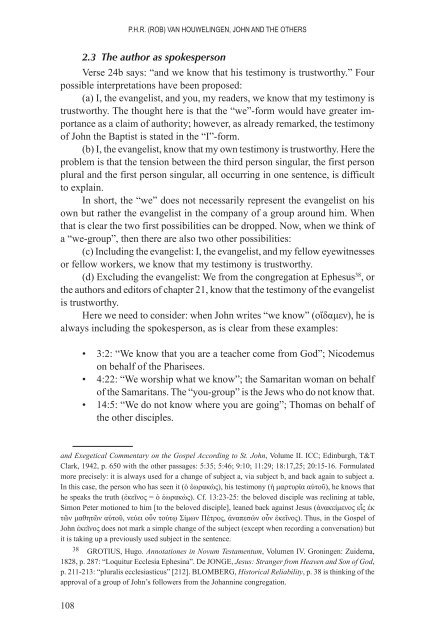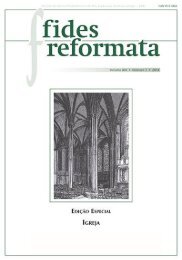Create successful ePaper yourself
Turn your PDF publications into a flip-book with our unique Google optimized e-Paper software.
P.H.R. (Rob) van Houwelingen, John and the Others<br />
2.3 The author as spokesperson<br />
Verse 24b says: “and we know that his testimony is trustworthy.” Four<br />
possible interpretations have been proposed:<br />
(a) I, the evangelist, and you, my readers, we know that my testimony is<br />
trustworthy. The thought here is that the “we”-form would have greater importance<br />
as a claim of authority; however, as already remarked, the testimony<br />
of John the Baptist is stated in the “I”-form.<br />
(b) I, the evangelist, know that my own testimony is trustworthy. Here the<br />
problem is that the tension between the third person singular, the first person<br />
plural and the first person singular, all occurring in one sentence, is difficult<br />
to explain.<br />
In short, the “we” <strong>do</strong>es not necessarily represent the evangelist on his<br />
own but rather the evangelist in the company of a group around him. When<br />
that is clear the two first possibilities can be dropped. Now, when we think of<br />
a “we-group”, then there are also two other possibilities:<br />
(c) Including the evangelist: I, the evangelist, and my fellow eyewitnesses<br />
or fellow workers, we know that my testimony is trustworthy.<br />
(d) Excluding the evangelist: We from the congregation at Ephesus 38 , or<br />
the authors and editors of chapter 21, know that the testimony of the evangelist<br />
is trustworthy.<br />
Here we need to consider: when John writes “we know” (οἴδαμεν), he is<br />
always including the spokesperson, as is clear from these examples:<br />
• 3:2: “We know that you are a teacher come from God”; Nicodemus<br />
on behalf of the Pharisees.<br />
• 4:22: “We worship what we know”; the Samaritan woman on behalf<br />
of the Samaritans. The “you-group” is the Jews who <strong>do</strong> not know that.<br />
• 14:5: “We <strong>do</strong> not know where you are going”; Thomas on behalf of<br />
the other disciples.<br />
and Exegetical Commentary on the Gospel According to St. John, Volume II. ICC; Edinburgh, T&T<br />
Clark, <strong>19</strong>42, p. 650 with the other passages: 5:35; 5:46; 9:10; 11:29; 18:17,25; 20:15-16. Formulated<br />
more precisely: it is always used for a change of subject a, via subject b, and back again to subject a.<br />
In this case, the person who has seen it (ὁ ἑωρακὼς), his testimony (ἡ μαρτυρία αὐτοῦ), he knows that<br />
he speaks the truth (ἐκεῖνος = ὁ ἑωρακὼς). Cf. 13:23-25: the beloved disciple was reclining at table,<br />
Simon Peter motioned to him [to the beloved disciple], leaned back against Jesus (ἀνακείμενος εἷς ἐκ<br />
τῶν μαθητῶν αὐτοῦ, νεύει οὖν τούτῳ Σίμων Πέτρος, ἀναπεσὼν οὖν ἐκεῖνος). Thus, in the Gospel of<br />
John ἐκεῖνος <strong>do</strong>es not mark a simple change of the subject (except when recording a conversation) but<br />
it is taking up a previously used subject in the sentence.<br />
38 GROTIUS, Hugo. Annotationes in Novum Testamentum, Volumen IV. Groningen: Zuidema,<br />
1828, p. 287: “Loquitur Ecclesia Ephesina”. De JONGE, Jesus: Stranger from Heaven and Son of God,<br />
p. 211-213: “pluralis ecclesiasticus” [212]. BLOMBERG, Historical Reliability, p. 38 is thinking of the<br />
approval of a group of John’s followers from the Johannine congregation.<br />
108

















